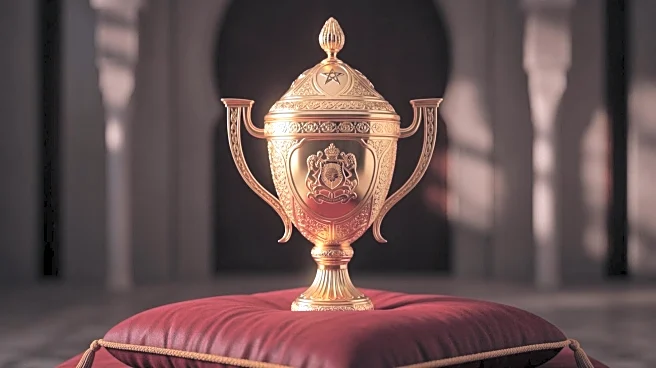What's Happening?
Morocco's under-20 football team achieved a historic victory by defeating Argentina 2-0 in the World Cup final held in Santiago, Chile. This triumph marks Morocco as only the second African nation to win
the under-20 World Cup, following Ghana's victory in 2009. Yassir Zabiri, a player for the Portuguese club Famalicão, scored both goals, leading his team to victory. King Mohammed VI of Morocco expressed immense joy and pride, sending warm congratulations to the team for their unprecedented achievement. The victory comes at a time when Morocco is experiencing Generation Z-led protests demanding government reforms, including better public services and tackling corruption.
Why It's Important?
Morocco's victory in the under-20 World Cup is significant as it highlights the country's growing presence in international football, potentially boosting national pride and unity. However, the backdrop of ongoing protests underscores domestic challenges, with citizens demanding reforms in education, healthcare, and government spending. The protests have criticized the government's allocation of resources towards sporting events, including the estimated €2 billion spent on stadium renovations for upcoming tournaments. This victory may serve as a temporary morale boost, but it also highlights the tension between national achievements and domestic dissatisfaction.
What's Next?
The Moroccan government may face increased pressure to address the demands of the protesters, who are calling for reforms and better allocation of resources. The upcoming Africa Cup of Nations and the 2030 World Cup, which Morocco is co-hosting, could further intensify scrutiny on government spending. The success of the under-20 team might inspire further investment in sports, but balancing this with public service improvements will be crucial. Stakeholders, including political leaders and civil society groups, are likely to engage in discussions on how to leverage this victory for broader societal benefits.
Beyond the Headlines
The victory of Morocco's under-20 team could have deeper implications for the country's cultural and social dynamics. It may foster a sense of national pride and unity, potentially influencing public sentiment and attitudes towards government policies. The protests highlight the ethical considerations of resource allocation, questioning the prioritization of sports over essential services. Long-term, this event could catalyze discussions on the role of sports in national identity and its impact on social cohesion.









